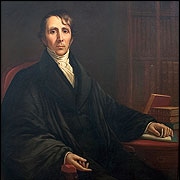William Ellery Channing's public faith
The leader of the early Unitarians proclaimed, 'I thank God that my own lot is bound up with that of the human race.'
From the time he was called to the pulpit of Boston's Federal Street Church, Arlington Street Church's predecessor, in 1803, Channing provided the intellectual leadership of a burgeoning liberal movement within the Congregational churches of Massachusetts. In challenging his Calvinist peers to see reason and intelligence, tolerance and fairness, as qualities to be fostered in religious life, he laid the foundations for an emerging Unitarian movement. In teaching that we derive our ideas of God "from our own souls," he opened the gates through which his younger Transcendentalist admirers passed.
Then, as now, liberals found themselves under attack. Channing and his fellow liberals were accused of being closet heretics whose faith and very sanity were questionable. Goaded by these attacks and at the urging of like-minded colleagues, Channing reluctantly agreed to set forth the tenets of this liberal faith. His Baltimore Sermon of May 5, 1819, embraced the Unitarian label; in print it became a runaway bestseller, stamping Channing as a prophet of a new spirit of freedom and reason in religion.
In recent decades there has been a shuffling downward of Channing in our ranks as something of a quaint character in a quaint time. This is a self-inflicted loss, for there are similarities in his time and ours-one of the starkest is the way "Bible-based values" are used to foster public policies of suppression.
Channing bluntly raised his public voice against the pervasive idolatry of his own time. "Human nature has never shown itself so fiendish than when it has cloaked its bad passions under the garb of religion, and let them loose," he said. "Religion was given to bind together, refine, soften human hearts. Its great ministry is that of love."
To Channing, the spirit in liberal Christianity was a hunger for more freedom, more justice, more fairness, more inclusion, and more fulfillment for ever more people. He lifted his voice against slavery, strengthening the abolitionist cause. And he supported Horace Mann's ideas for a revolutionary American approach to public education, Joseph Tuckerman's ideas for the creation of a new American profession—social work among the victims of urban poverty—and some of the liveliest harbingers of early American feminism, including Elizabeth Peabody, a pioneer of early childhood education.
Knowing that contemporaries would mock him as an unredeemed romantic about human nature, he put them on notice and paved the way for twentieth-century religious humanism: "I do and I must reverence human nature. I shut my eyes on none of its weakness and crimes. But injured, trampled on, and scorned as our nature is, I still turn to it with intense sympathy and strong hope. And I thank God that my own lot is bound up with that of the human race."
This article appeared in the March/April 2005 issue of UU World.
Comments powered by Disqus







